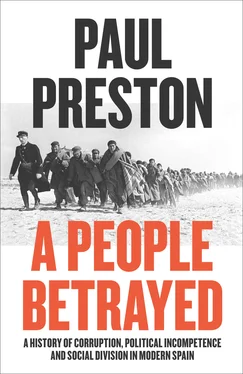After the process known as the disentailment or desamortización , Spain ceased to be a feudal society in legal and economic terms. However, it remained so in social and political terms. Traditional rural elites retained their power long after the Restoration of the monarchy in 1874 and the attempt to create a modern state by Antonio Cánovas del Castillo in his Constitution of 1876. That state worked only in so far as it was in the interests of the local bosses or caciques (a South American Indian word meaning ‘chief’) to allow it to do so. It was only with the growth of industry in the Basque Country, Asturias, Catalonia and Madrid that a different and more modern politics became even a remote possibility. Then, the vested interests of the landed caciques ensured that their superior power was exerted over the reforming bourgeoisie which, itself under pressure from the first signs of working-class discontent, scurried to make an alliance in which it was the junior partner. Loss of empire would lead to a weakening of the alliance but it would always be consolidated when the industrial bourgeoisie needed the protection of the repressive machinery that was the state’s principal asset. Pressure for political change and social development was simply dismissed as subversion.17
Richard Ford wrote in the 1840s: ‘I once beheld a cloaked Spaniard pacing mournfully in the burial ground of Seville. When the public trench was opened, he drew from beneath the folds the dead body of his child, cast it in and disappeared. Thus, half the world lives without knowing how the other half dies.’18 In a land in which oppressive poverty coexisted with an equally parasitical government and Church, the law was not respected and smugglers and bandits were the objects of hero worship. When Ford enquired of Spaniards where brigands hid, he was frequently told that ‘it was not on the road that they were most likely to be found, but in the confessional boxes, the lawyers’ offices, and still more in the bureaux of government’. Of the Civil Guard, Ford wrote that they were nothing but rogues ‘used to keep down the expression of indignant public opinion, and, instead of catching thieves, upholding those first-rate criminals, foreign and domestic, who are now robbing poor Spain of her gold and liberties’.19
Founded by two royal decrees of 28 March and 13 May 1844, the Civil Guard was intended to be a disciplined nationwide police force, staffed by men seconded from the army. The corps was organized by the Inspector General of the Army, the Duke of Ahumada.20 Between 1844 and the 1860s, the Civil Guard established itself as a dour and brutal army of occupation protecting the great estates and mines against the resentment of their workers. It became part of the army in 1878. Banditry was gradually eliminated, but the Civil Guard’s ominous ubiquity forced the peasants to direct their rebelliousness against it and therefore against the state. ‘Every Civil Guard became a recruiting officer for anarchism, and, as the anarchists increased their membership, the Civil Guard also grew.’21 In fact, from the last quarter of the nineteenth century until the death of General Franco, many Civil Guards were actually recruited from the sons of men who had served in the corps.
The sense that the Civil Guard was a hostile institution imposed from outside was intensified by the fact that social interaction was forbidden between the rank and file and the inhabitants of the area where they served. Needless to say, this prohibition did not extend to the officers, who usually maintained cordial relations with the local clergy and those who owned the land, the mines and the factories. In small towns and villages, Civil Guards and their families lived in fortified barracks known as the casa-cuartel . In Asturias, the casa-cuartel was often paid for by the mining companies. In many places, it was common for the local fuerzas vivas (notables) and employers’ organizations to subsidize the casa-cuartel with gifts of food, wine and, sometimes, furniture. Such gifts were publicized in the local press as well as in the official publications of the Civil Guard, which intensified the sense that the corps was a force at the service of the wealthy.22 This perception was reinforced by the fact that a Civil Guard could not serve in the area where he or his wife had been born. In a country of fierce localism ( patriotismo chico ), where any stranger could be seen not just as an outsider but virtually as a foreigner, this increased the hostility towards the Civil Guard. In Asturian mining villages, for instance, the hatred of the Civil Guard was intense both for political reasons and also because they were often from Galicia. Guards were not permitted to move about unarmed or alone and so were usually in pairs ( la pareja ). Thus ‘their relations with the working classes were of open hostility and suspicion. Living as they did among their enemies, they became unusually ready to shoot.’23
The Civil Guard responded to any social upheaval with aggression. In particular, signs of anarchist ideology were perceived as an especially pernicious and barbaric foreign doctrine. Anarchists were seen as ‘harmful beasts’, worse than common criminals because of their utopian ambitions for society. So the destructive influence of ‘those who have ideas’ had to be eliminated. Anarchists were the enemies of society and especially of the Civil Guards.24
Ford believed that bad government and poor communications were the principal cause of poverty and economic backwardness.
It has, indeed, required the utmost ingenuity and bad government of man to neutralise the prodigality of advantages which Providence has lavished on this highly favoured land, and which, while under the dominion of the Romans and Moors, resembled an Eden, a garden of plenty and delight, when in the words of an old author, there was nothing idle, nothing barren in Spain – ‘nihil otiosum, nihil sterile in Hispania’. A sad change has come over this fair vision, and now the bulk of the Peninsula offers a picture of neglect and desolation, moral and physical, which it is painful to contemplate.
He added, ‘Spain is a land which never yet has been able to construct or support even a sufficient number of common roads or canals for her poor and passive commerce and circulation.’25
For Ford, the essence of bad government in Spain was corruption. ‘Public poverty’, he wrote,
is the curse of the land, and all empleados or persons in office excuse themselves on dire necessity … Some allowance, therefore, may be made for the rapacity which, with very few exceptions, prevails; the regular salaries, always inadequate, are generally in arrear, and the public servants, poor devils, swear that they are forced to pay themselves by conniving at defrauding the government; this few scruple to do, as all know it to be an unjust one, and that it can afford it; indeed, as all are offenders alike, the guilt of the offence is scarcely admitted. Where robbing and jobbing are the universal order of the day, one rascal keeps another in countenance … A man who does not feather his nest when in place, is not thought honest, but a fool; es preciso, que cada uno coma de su oficio . It is necessary, nay, a duty , as in the East, that all should live by their office; and as office is short and insecure, no time or means is neglected in making up a purse …
He offers an example:
We remember calling on a Spaniard who held the highest office in a chief city of Andalucia. As we came into his cabinet a cloaked personage was going out; the great man’s table was covered with gold ounces, which he was shovelling complacently into a drawer, gloating on the glorious haul … This gentleman, during the Sistema , or Riego constitution, had, with other 1oyalists, been turned out of office; and, having been put to the greatest hardships, was losing no time in taking prudent and laudable precautions to avert all similar calamity for the future. His practices were perfectly well known in the town, where people simply observed, ‘ Está atesorando , he is laying up treasures,’ – as every one of them would most certainly have done, had they been in his fortunate position … Donde no hay abundancia, no hay observancia . The empty sack cannot stand upright, nor was ever a sack made in Spain into which gain and honour could be stowed away together; honra y provecho, no caben en un saco o techo ; here virtue itself succumbs to poverty, induced by more than half a century of misgovernment, let alone the ruin caused by Buonaparte’s invasion, to which domestic troubles and civil wars have been added.26
Читать дальше












